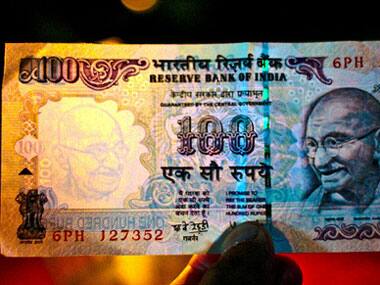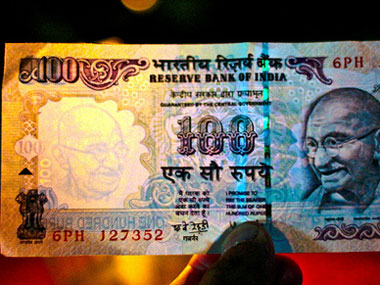RBI is waiting for the Indian Rupee (INR) to stabilize before it takes steps to help the economy grow from decade low growth rates of 5% seen in fiscal 2012-13. The INR is trading at levels of Rs 61 to the USD and is threatening to go below all time lows of Rs 61.21 seen in the beginning of July 2013. RBI had taken steps to curb INR volatility at levels of around Rs 60 by tightening liquidity and ensuring money market rates are in double digit levels. However, the rupee after a brief period of stability has again turned weak implying that market forces are strong on selling the INR.
[embedalsosee]
The markets are worried on what the RBI will do if the rupeegoes below all time lows. Will RBI take further monetary tightening measures? If the central bank does take monetary tightening measures, India’s GDP growth is likely to fall below 5% levels for this fiscal year even as the RBI revised growth estimates from 5.7% to 5.5%.
[caption id=“attachment_1002025” align=“alignleft” width=“380”]
 RBI has always maintained that it does not have a target for the INR. Dr Raghuram Rajan, the government’s chief economic advisor too has gone on record saying that the government does not target any specific level for the INR[/caption]
RBI has always maintained that it does not have a target for the INR. Dr Raghuram Rajan, the government’s chief economic advisor too has gone on record saying that the government does not target any specific level for the INR[/caption]
Is the level of the rupee at above Rs 60 to the USD unpalatable to policy makers? What is the significance of this level? Every level above Rs 60 will be record lows for the INR but the same was true when the INR touched Rs 60 as it broke all records when it started trending down from Rs 57 levels. Why did the RBI not initiate measures to prevent the INR from touching Rs 60?
RBI wants stability in the INR? At what levels? Rs 60, Rs 55 or even Rs 65 (if it goes to that). RBI has always maintained that it does not have a target for the INR. Dr Raghuram Rajan, the government’s chief economic advisor too has gone on record saying that the government does not target any specific level for the INR. If the central bank and the government do not have any specific level in mind for the INR, then why is the focus on the INR so sharp at levels of Rs 60 and above?
The question is “Is there a Right Level for the INR?” Or for that matter “Is there a wrong level for the INR?” What should be the right level for the INR? Is the REER (Real Effective Exchange Rate) the right measure for the INR? where the currency is measured against a trade weighted basket of other currencies (6 and 36) and adjusted for inflation.
The INR has been on a long term decline against the USD, falling from levels of Rs 20 to current levels of Rs 60 over the last twenty years. The economy in the meanwhile has had its ups and downs with growth rising to levels of 9.5% from 4% levels before falling to levels of 5% in 2012-13. The INR does not seem to have had an effect of pulling down long term growth prospects of the country even as it has shown a sustained fall against the USD. On a REER basis, the currency has depreciated with index levels below 100 indicating that the weakness is broad based.
The government and the RBI cannot really prevent a trend decline in the INR but can only hold it for periods of time. The INR will go where it wants to go and policy makers have to get on with business rather than trying to the stem the INR fall. Needless to say right policies will prevent decline and will bring about strength to the INR and vice versa.
Arjun Parthasarathy is the Editor of www.investorsareidiots.com a web site for investors.
Arjun Parthasarathy has spent 20 years in the financial markets, having worked with Indian and multinational organisations. His last job was as head of fixed income at a mutual fund. An MBA from the University of Hull, he has managed portfolios independently and is currently the editor of www.investorsareidiots.com </a>. The website is for investors who want to invest in the right financial products at the right time.
)